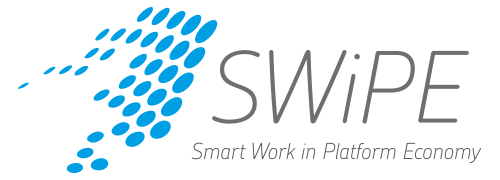Research on platform work was a key theme in the seminar organized by Smart Work in Platform Economy consortium and Turku Centre for Labour Studies, TCLS. In the seminar “Platform as a new form of work” SWiPE researchers presented results of an online survey carried out among the members of Akava, the Confederation of Unions for Professional and Managerial Staff in Finland, as well as research related to Upworkers. Expectations of platform work are positive and platform work is estimated to grow in the future.
SWiPE researchers Anne Kovalainen and Sanna Rouhiainen from University of Turku presented the results of an online survey targeted to Akava members. The survey shows that digital tools are very important in expert work and that experts do not fear that technological advancement would weaken their position in the labour market. The survey also shows that 65 per cent has used or bought services through a platform, but most experts have not yet worked through a platform. At the same time 37 per cent of all respondents are willing to sell their expertise through a platform, and platform work is seen as an interesting possibility, but not as the main source of income.
PhD student Mareike Seifried from Munich School of Management and SWiPE researched Petri Rouvinen from Etla presented results on a study made among Upworkers and especially Finnish Upworkers. Mareike Seinfried said that online gig workforce remains a relatively small part of the economy but its share is growing very rapidly. The study showed that TOP5 Upworker task categories are translation, web, mobile and software development, writing, design and creative, and sales and marketing. She presented development hypotheses related to prior success, project complexity, experience and contract type. The prior success record and work experience of a freelancer, an employer’s prior experience and using fixed-price contracts are positively related with project success. Having hired multiple freelancers to complete a project, the number of skills required to perform a project and project description length are negatively related with project success.
Petri Rouvinen highlighted that there is a real market for online labour markets, which allow unmet demand and supply to meet, economically under-utilized time and skills to be used as well as possibilities for labour cost arbitrage to take place. At the same time he emphasized that platform work will be mostly for extra income especially in Finland. Petri Rouvinen introduced the main motivators of the Upworkers as found in the recent studies of Etla, University of Turku, Finnish Institute of Occupational Health and the Ludwig-Maximilians-Universität München. Among the five most motivating factors for Upworkers are independence, flexibility, extra earnings, reputation building and ease of contracting.
